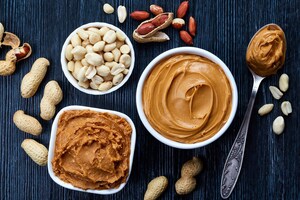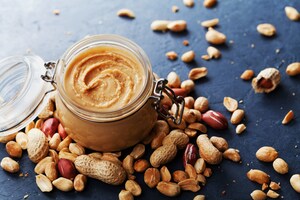ALBANY, Ga., June 11, 2024 /PRNewswire/ -- There's a persistent myth that claims humans use only 10 percent of their brain. While it's widely circulated, it's entirely false. The fact is science has confirmed people use their entire brain every day. And, the brain doesn't take a rest at night. Some parts become even more active during sleep.
"Our brains are an organ so, just like our heart and lungs, the brain benefits from quality sleep, regular exercise, healthy foods and low stress," says Dr. Samara Sterling, a nutrition scientist and research director for The Peanut Institute. "It's important to take care of the brain so it can operate at peak performance and continue to efficiently control and regulate the body."
1. Brain Health and Sleep
No matter the age, sleep is important since recent research has found that the brain does vital housekeeping during the night. While the body is at rest, the brain recharges, reorganizes and removes toxic waste that has accumulated throughout the day1.
Without adequate sleep, the brain has trouble concentrating, remembering things and responding quickly. How much sleep a person requires ranges from seven to eight hours for older adults to nine to eleven hours for teenagers. In general, a minimum of seven hours is recommended.
"Research has found that sleep helps improve memory recall, reduces mental fatigue and regulates metabolism," explains Sterling. "In addition, sleep benefits the entire body since it promotes growth in children and teens, aids heart health in adults and keeps the immune system strong for everyone."
2. Mental Exercise for Brain Health
It's irrefutable that the brain benefits from regular mental activity. According to Harvard Health, researchers concluded that stimulating the brain promotes new connections between nerve cells and may even help generate new ones.
Crossword puzzles, card games, Sudoku, memory quizzes, word searches, number problems and other activities that use math, logic and word processing are good brain "benders." However, it's essential to do a variety of exercises (instead of the same one over and over) to continue to activate and push the brain so it must engage and work hard to complete the new tasks.
The brain also benefits from a combination of learning that's paired with physical activity. For example, take up a new instrument, master an unfamiliar dance or tackle an untried exercise like tai chi, yoga or Pilates.
3. Physical Exercise to Pump Up the Brain
Regular physical exercise delivers benefits from top to bottom.
Starting at the top, a number of studies have found that the parts of the brain that control thinking and memory have greater volume in people who exercise.2 For those concerned about Alzheimer's, an analysis of 16 studies with more than 160,000 participants identified a 45 percent reduction in the risk of developing the disease for those who engaged in regular physical activity.3
Furthermore, research published in the Journal of Sport and Health Science in 2020 pinpointed that those who are in the early to middle stages of Alzheimer's disease, benefit from activities that get the heart pumping or involve resistance, such as brisk walking, swimming and light strength training.4
For the rest of the body, exercise helps lower the risk of heart disease, Type 2 diabetes, high blood pressure and colon and breast cancer, among other things.
4. Follow a Healthy Brain Diet
Not all food is created equally and there are specific items that are beneficial for the brain. The "good" list includes nuts and seeds, salmon, beans, blueberries, dark leafy greens, avocados and red cabbage, to name a few.
Peanuts and peanut butter fall into the nuts category and are a wise choice since they're packed with 19 vitamins and minerals plus they are low cost, tasty and versatile.
A recent study of more than 6,000 adults showed that higher consumption of nuts eaten as part of a brain-healthy diet called the MIND diet was associated with a 30 percent reduced risk of cognitive impairment.5
Nutritionally, peanuts contain high levels of niacin and are a good source of vitamin E – two nutrients that have long been known to protect against Alzheimer's disease and age-related cognitive decline. One study found that niacin intake from foods was associated with a slower annual rate of cognitive decline and a 70 percent lower risk of Alzheimer's.6
Peanuts also have resveratrol, a bioactive that is believed to be beneficial in fighting against Alzheimer's and other nerve degenerating diseases. Lab tests in 2018 showed resveratrol had the ability to reverse cognitive defects, as well as restore cognitive function in mice with neurological disorders.7
5. Stress Reduction to Calm the Brain
Stress isn't just difficult to handle, it also impacts the brain. Prolonged exposure to stress hormones can cause inflammation and dysfunction in the brain that affect memory, cognition, attention and mood.
Deep breathing, meditation, exercise, outdoor walks and choosing healthy foods are tools to bring down stress levels. Peanuts can play a role in stress reduction since they pack p-coumaric acid. A 2014 animal study found that p-coumaric acid helped reduce stress and anxiety. Researchers noted that the antioxidant could have similar stress-reducing effects as some of the leading anti-anxiety medications.8
In 2021, University of Barcelona researchers studied a group of college students ages 18 to 33 for six months. They found those who had a daily serving of peanuts or peanut butter experienced improved memory function and decreases in anxiety, depression and stress.9
"If you're looking to give your brain a boost, consider incorporating a serving of peanuts into your daily diet," adds Sterling. "In addition to niacin, vitamin E, p-coumaric acid and resveratrol, peanuts and peanut butter have a unique combination of healthy fats, vitamins, minerals, fiber and protein that deliver both mind and body benefits."
For more health news and recipe ideas that incorporate peanuts and peanut butter, visit PeanutInstitute.com. The Peanut Institute also provides news and updates on Facebook, Twitter, Instagram, LinkedIn and Pinterest.
Based in Albany, Ga., The Peanut Institute is a non-profit organization supporting nutrition research and developing educational programs to encourage healthful lifestyles that include peanuts and peanut products. The Peanut Institute pursues its mission through research programs, educational initiatives and the promotion of healthful lifestyles to consumers of all ages. As an independent forum, The Peanut Institute is uniquely positioned to work with all segments of the food industry, the research community, academia, consumer organizations and governmental institutions.
Sources:
- Eugene AR, Masiak J. The Neuroprotective Aspects of Sleep. MEDtube Sci. 2015 Mar;3(1):35-40. PMID: 26594659; PMCID: PMC4651462.
- Colcombe SJ, Erickson KI, Scalf PE, Kim JS, Prakash R, McAuley E, et al. Aerobic exercise training increases brain volume in aging humans. J Gerontol A Biol Sci Med Sci. 2006;61:1166–70. doi: 10.1093/gerona/61.11.1166. [PubMed] [CrossRef] [Google Scholar]
- M. Hamer, Y. Chida Physical activity and risk of neurodegenerative disease: a systematic review of prospective evidence Psychol Med, 39 (2009), pp. 3-11
- Journal of Sport and Health Science, Volume 9, Issue 5, September 2020, Pages 394-404
- Wenjian Lin, Xiaoyu Zhou, Xueyuan Liu, Association of adherence to the Chinese version of the MIND diet with reduced cognitive decline in older Chinese individuals: Analysis of the Chinese Longitudinal Healthy Longevity Survey, The Journal of nutrition, health and aging, Volume 28, Issue 2, 2024, 100024, ISSN 1279-7707, https://doi.org/10.1016/j.jnha.2023.100024.
- Morris MC, Evans DA, Bienias JL, Scherr PA, Tangney CC, Hebert LE, Bennett DA, Wilson RS, Aggarwal N. Dietary niacin and the risk of incident Alzheimer's disease and of cognitive decline. J Neurol Neurosurg Psychiatry. 2004 Aug;75(8):1093-9. doi: 10.1136/jnnp.2003.025858. PMID: 15258207; PMCID: PMC1739176. https://pubmed.ncbi.nlm.nih.gov/15258207/
- Velmurugan BK, Rathinasamy B, Lohanathan BP, Thiyagarajan V, Weng CF. Neuroprotective Role of Phytochemicals. Molecules. 2018 Sep 27;23(10):2485. doi: 10.3390/molecules23102485. PMID: 30262792; PMCID: PMC6222499. https://www.ncbi.nlm.nih.gov/pmc/articles/PMC6222499/
- Scheepens A, Bisson JF, Skinner M. p-Coumaric acid activates the GABA-A receptor in vitro and is orally anxiolytic in vivo. Phytother Res. 2014 Feb;28(2):207-11. doi: 10.1002/ptr.4968. Epub 2013 Mar 26. PMID: 23533066. https://pubmed.ncbi.nlm.nih.gov/23533066/
- Isabella Parilli-Moser, Inés Domínguez-López, Marta Trius-Soler, Magda Castellví, Beatriz Bosch, Sara Castro-Barquero, Ramón Estruch, Sara Hurtado-Barroso, Rosa M. Lamuela-Raventós. Consumption of peanut products improves memory and stress response in healthy adults from the ARISTOTLE study: A 6-month randomized controlled trial. Clinical Nutrition. 2021 Sept;40(11). DOI:https://doi.org/10.1016/j.clnu.2021.09.020. https://www.clinicalnutritionjournal.com/article/S0261-5614(21)00437-4/fulltext
SOURCE The Peanut Institute

WANT YOUR COMPANY'S NEWS FEATURED ON PRNEWSWIRE.COM?
Newsrooms &
Influencers
Digital Media
Outlets
Journalists
Opted In






Share this article